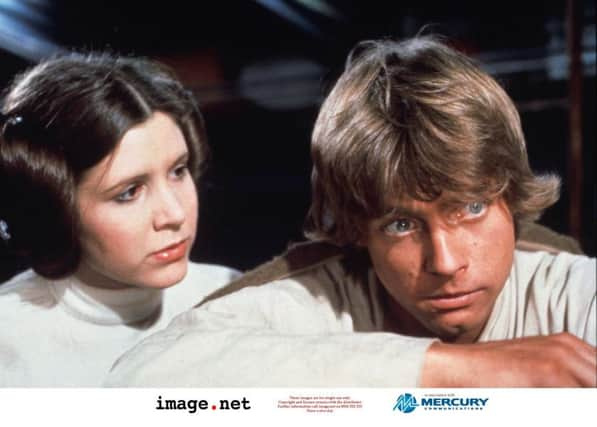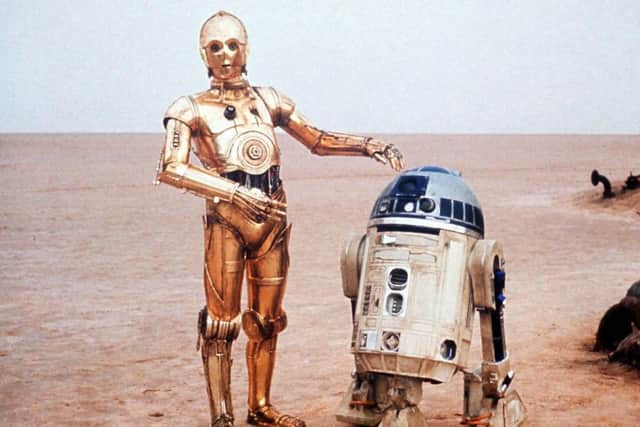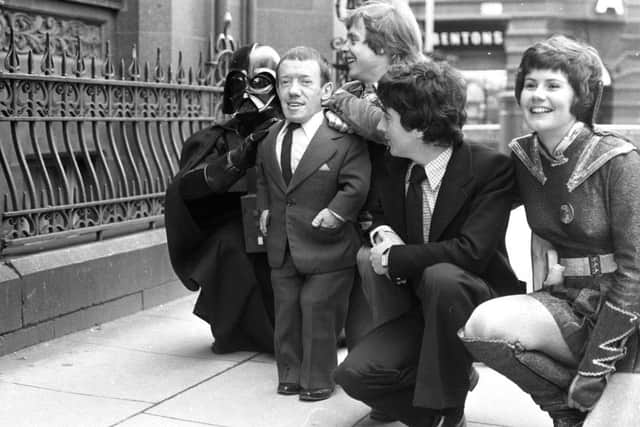May the fortieth be with you, Luke


But Star Wars was no ordinary movie. It had certainly been no-one’s idea of a blockbuster.
Exactly 40 years ago, at the tail end of a Christmas that had seen Penelope Keith and Elton John appear with Morecambe and Wise, Anthea Redfern with Bruce Forsyth and Paul McCartney with Mike Yarwood, and during which the death of Charlie Chaplin at 88 had brought down the curtain on a cinema era, a new one dawned.
Advertisement
Hide AdAdvertisement
Hide AdQueues had started to form at 7am at the Dominion and Leicester Square cinemas in London for the few unreserved seats at the premiere of a low-budget film that had, through word of mouth during the summer and autumn, became a phenomenon.


In the cold December air, touts were making £30 apiece from tickets with a face value of £2.20 – the regular allocation of which was sold out until March. Carrie Fisher as Princess Leia, Mark Hamill as Luke Skywalker and a little known actor named Harrison Ford, as Han Solo, were the principals of the two-hour fantasy George Lucas had shot, to little notice, on a modest budget of $11m. Sir Alec Guinness, its only marquee name, thought it was “fairy tale rubbish”.
Star Wars had opened on May 25 in fewer than 32 American cinemas. Its distributor, 20th Century Fox, doubted initially, that it would make money at all.
Only Steven Spielberg, who was shooting Close Encounters of the Third Kind at around the same time, could see the potential. He had bet Lucas 2.5 per cent of its profits that Star Wars would be the bigger hit. Even Lucas didn’t think so, so he took the bet – and as a result, Spielberg is said still to receive a percentage of the film’s profits.
Advertisement
Hide AdAdvertisement
Hide AdIn the age before the internet, word travelled across the Atlantic only as fast as the studios and TV networks would allow. They had been taken aback by the rollercoaster that Star Wars had become, and by the time the December 27 premiere rolled around in Britain, the marketing teams were ready.


A huge publicity campaign and a range of T-shirts and toys in the shops in time for Christmas saw to it that this would be a bigger launch even than the previous year’s blockbuster, Jaws. Reaction to the film was overwhelmingly positive, not just from paying audiences, but also by bona fide scientists.
The Daily Telegraph’s science correspondent Adrian Berry, a Fellow of the Royal Astronomical Society, wrote that with the exception of 2001: A Space Odyssey, science fiction films had been made “with neither imagination nor money”. He added: “Star Wars is far removed from these shoddy productions. It is the best such film since 2001, and in certain respects it is one of the most exciting ever made.”
Derek Malcolm’s review in The Guardian said that while Star Wars was not the best film of the year, it was “enormous and exhilarating fun for those who are prepared to settle down in their seats and let it all wash over them”.
That, he added, was “more or less exactly what the vast majority of the cinema-going public want just now”.